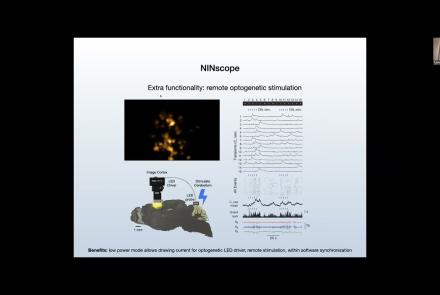This lesson introduces concepts and practices surrounding reference atlases for the mouse and rat brains. Additionally, this lesson provides discussion around examples of data systems employed to organize neuroscience data collections in the context of reference atlases as well as analytical workflows applied to the data.
Difficulty level: Beginner
Duration: 03:04:29
Speaker: :
This talk covers EBRAINS, an open research infrastructure that gathers data, tools and computing facilities for brain-related research, built with interoperability at the core.
Difficulty level: Beginner
Duration: 8:22
Speaker: : Petra Ritter
This lesson discusses the need for and approaches to integrating data across the various temporal and spatial scales in which brain activity can be measured.
Difficulty level: Beginner
Duration: 1:35:37
Speaker: : Leon Martin & Leon Stefnovski
This lesson consists of lecture and tutorial components, focusing on resources and tools which facilitate multi-scale brain modeling and simulation.
Difficulty level: Beginner
Duration: 3:46:21
Speaker: : Dionysios Perdikis
In this talk, challenges of handling complex neuroscientific data are discussed, as well as tools and services for the annotation, organization, storage, and sharing of these data.
Difficulty level: Beginner
Duration: 21:49
Speaker: : Thomas Wachtler
This lecture describes the neuroscience data respository G-Node Infrastructure (GIN), which provides platform independent data access and enables easy data publishing.
Difficulty level: Beginner
Duration: 22:23
Speaker: : Michael Sonntag
This lesson provides an introduction to the course Neuroscience Data Integration Through Use of Digital Brain Atlases, during which attendees will learn about concepts for integration of research data, approaches and resources for assigning anatomical location to brain data, and infrastructure for sharing experimental brain research data.
Difficulty level: Beginner
Duration: 14:02
Speaker: : Trygve Leergard
This talk covers the various concepts, motivations, and trends within the neuroscientific community related to the sharing and integration of brain research data.
Difficulty level: Beginner
Duration: 30:39
Speaker: : Jan G. Bjaalie
This lesson focuses on the neuroanatomy of the human brain, delving into macrostructures like cortices, lobes, and hemispheres, and microstructures like neurons and cortical laminae.
Difficulty level: Beginner
Duration: 51:30
Speaker: : Nicola Palomero-Gallagher
This lesson provides an introduction to the European open research infrastructure EBRAINS and its digital brain atlas resources.
Difficulty level: Beginner
Duration: 27:45
Speaker: : Trygve Leergard
In this lesson, attendees will learn about the challenges in assigning experimental brain data to specific locations, as well as the advantages and shortcomings of current location assignment procedures.
Difficulty level: Beginner
Duration: 32:18
Speaker: : Ingvild Elise Bjerke
This lesson covers the inherent difficulties associated with integrating neuroscientific data, as well as the current methods and approaches to do so.
Difficulty level: Beginner
Duration: 25:41
Speaker: : Trygve Leergard
Attendees of this talk will learn about QuickNII, a tool for user-guided affine registration of 2D experimental image data to 3D atlas reference spaces, which also facilitates data integration through standardized coordinate systems.
Difficulty level: Beginner
Duration: 21:08
Speaker: : Maja Puchades
This lesson provides an overview of DeepSlice, a Python package which aligns histology to the Allen Brain Atlas and Waxholm Rat Atlas using deep learning.
Difficulty level: Beginner
Duration: 17:30
Speaker: : Harry Carey
Course:
Overview of the content for Day 1 of this course.
Difficulty level: Beginner
Duration: 00:01:59
Speaker: : Tristan Shuman
Course:
Overview of Day 2 of this course.
Difficulty level: Beginner
Duration: 00:03:28
Speaker: : Tristan Shuman
Course:
Best practices: the tips and tricks on how to get your Miniscope to work and how to get your experiments off the ground.
Difficulty level: Beginner
Duration: 00:53:34
Course:
This talk compares various sensors and resolutions for in vivo neural recordings.
Difficulty level: Beginner
Duration: 00:24:03
Speaker: : Susie Feng, Zach Pennington, Caleb Kemere
Course:
This talk delves into challenges and opportunities of Miniscope design, seeking the optimal balance between scale and function.
Difficulty level: Beginner
Duration: 00:21:51
Speaker: : Susie Feng, Zach Pennington, Tycho Hoogland
Course:
Attendees of this talk will learn aobut computational imaging systems and associated pipelines, as well as open-source software solutions supporting miniscope use.
Difficulty level: Beginner
Duration: 00:17:56
Speaker: : Susie Feng, Zach Pennington, Laura Waller
Topics
- Artificial Intelligence (7)
- Philosophy of Science (5)
- Provenance (3)
- protein-protein interactions (1)
- Extracellular signaling (1)
- Animal models (8)
- Assembly 2021 (29)
- Brain-hardware interfaces (14)
- Clinical neuroscience (40)
- International Brain Initiative (2)
- Repositories and science gateways (11)
- Resources (6)
- General neuroscience
(62)
- Neuroscience (11)
- Cognitive Science (7)
- Cell signaling (6)
- Brain networks (11)
- Glia (1)
- (-) Electrophysiology (41)
- Learning and memory (5)
- Neuroanatomy (24)
- Neurobiology (16)
- Neurodegeneration (1)
- (-) Neuroimmunology (1)
- Neural networks (15)
- Neurophysiology (27)
- Neuropharmacology (2)
- Neuronal plasticity (16)
- Synaptic plasticity (4)
- Visual system (12)
- Phenome (1)
- General neuroinformatics
(27)
- Computational neuroscience (279)
- Statistics (7)
- Computer Science (21)
- Genomics (34)
- Data science
(34)
- Open science (61)
- Project management (8)
- Education (4)
- Publishing (4)
- Neuroethics (42)




















